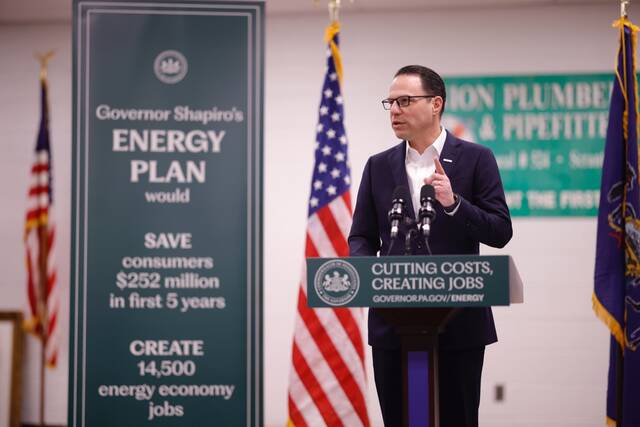SCRANTON — Gov. Josh Shapiro announced his new energy policy at a press conference in Scranton on Wednesday. He said the policy is simple and will lead to more energy jobs, lower costs for consumers, address climate change, and make Pennsylvania a leader in energy for many years.
Shapiro decided to introduce his new energy plan for Pennsylvania in Scranton, known as the “Electric City.” He said the plan will create almost 15,000 energy jobs.
The governor stated that the plan would:
• Save Pennsylvania consumers $252 million in the first five years and bring $5.1 billion in investment in clean, reliable energy sources.
• Generate over 14,500 jobs and help Pennsylvania stay energy independent.
• Create a program to reduce emissions using Pennsylvania’s status as a major energy producer to cut climate emissions and lower prices for Pennsylvanians through an electric bill rebate.
• Establish new reliability targets by 2035 to make a more diverse, resilient electricity grid, attract more federal funds, and support Pennsylvania’s low-carbon natural gas and nuclear facilities.
• Expand on the governor’s economic development strategy by investing in clean energy production.
Participating in the press conference at United Association Local 524, 711 E. Corey St., Scranton, were: Scranton Mayor Paige Cognetti; Rep. Kyle Donahue; Jackson Morris, director, State Power Sector Policy, Climate & Energy at the National Resources Defense Council; Robert Bair, president of the Pennsylvania State Building and Construction Trades; Pat Dolan, business manager for United Association Local Union 524; and Patrick Cicero, Pennsylvania Consumer Advocate.
State Rep. Eddie Day Pashinski and Rep. Jim Haddock also attended the press conference.
Reactions and Responses
The plan has received both praise and criticism. Shapiro emphasized his commitment to seeing the plan through.
“My plan is bold and ambitious, but now is the time to make it happen,” Shapiro said. “I’m asking the legislature — both parties — to work together to find common ground and complete this.”
Shapiro mentioned that Pennsylvania has been a leading innovator in energy production for many years, from the coal mines in Northeastern Pennsylvania to the first oil well in Titusville and the initial civilian nuclear reactor.
“Today, Pennsylvania remains at the forefront as the only state with two regional clean hydrogen hub networks,” Shapiro said. “However, Pennsylvania lags behind other states in diversifying its energy sources and creating clean, reliable, and affordable energy.”
Shapiro stated his energy plan will help secure Pennsylvania’s position as one of the world’s major energy producers and protect consumers from increasing utility costs due to global instability and foreign conflicts.
The governor of Pennsylvania, Shapiro, said that the state needs to do more to compete in creating clean and reliable energy, reduce electricity bills for consumers, and increase opportunities for businesses and workers.
Two initiatives
As part of his plans for Pennsylvania's energy future, Shapiro wants to introduce two important proposals that he believes will decrease prices for consumers, protect and generate jobs in Pennsylvania, and decrease climate emissions.
Shapiro's proposal is the Pennsylvania Climate Emissions Reduction Act (PACER), which will create a Pennsylvania-specific cap-and-invest program for carbon, allowing the state to set its own limit on carbon and invest in lowering electricity bills for consumers. If passed, PACER would remove Pennsylvania from RGGI, giving the state control over its energy future.
Shapiro said that the benefits of PACER will directly help Pennsylvania consumers. Under PACER, 70% of the revenue will be given back to Pennsylvania residents as a rebate on their electric bill — more than in any other cap-and-invest program in the nation — resulting in long-term relief on energy costs.
Aside from reducing emissions and saving Pennsylvanians money on their bills, Shapiro stated that PACER will also support projects that decrease air pollution in Pennsylvania, further lower energy costs for low-income Pennsylvania residents, and invest in new job-creating clean energy projects such as carbon capture and storage, geothermal deployment, and clean hydrogen in energy communities that have hosted coal, oil, or gas infrastructure.
Shapiro said that Pennsylvania's energy standards have become outdated over the last 20 years, causing the state to lose out to others with more up-to-date standards that attract new energy investment.
Shapiro's plan also introduces the Pennsylvania Reliable Energy Sustainability Standard (PRESS), which aims to attract federal investments in the state and keep utility costs low in the long term by establishing a reliable and affordable fleet of power sources needed for the future.
The governor said that PRESS is designed to encourage a more reliable power generation fleet to combat the risks of extreme weather, cyberattacks, and other challenges that could affect individual sources of electricity.
Sen. Marty Flynn, D-Scranton, praised Shapiro's plan.
Flynn expressed support for Governor Shapiro's initiatives, saying that they align with the needs and aspirations of the state and will set an example for the nation.



